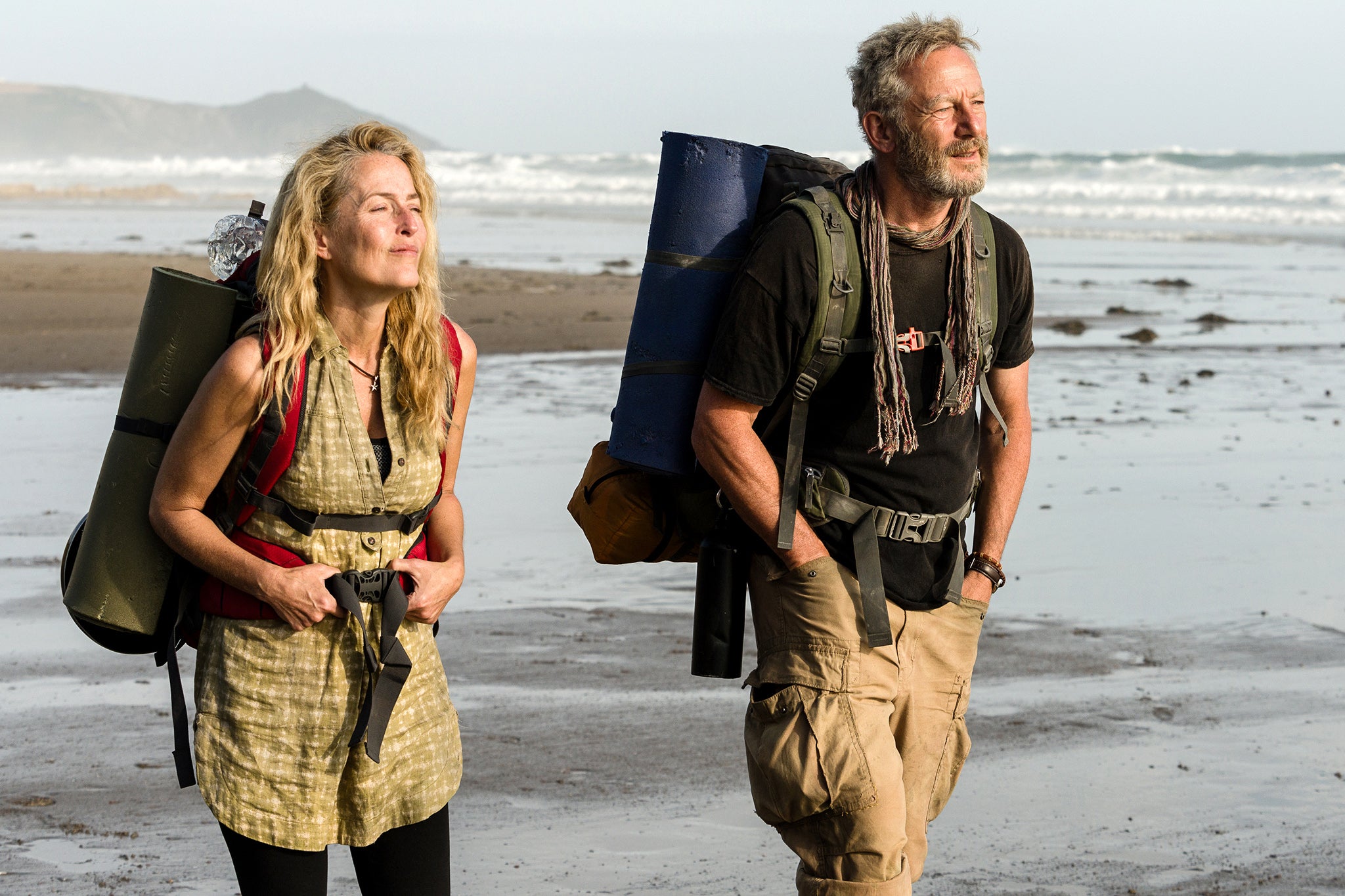Days before The Observer published its bombshell report on the alleged fabrication of key elements of Raynor Winn’s pop-inspirational tale The Salt Path, I was the audience to two early Salt Path haters: my mother and grandmother. “A load of crap,” my grandmother exclaimed between bites of a pub lunch. “It was all a bit neat, wasn’t it?” added my mother.
They complained not because the just-released film adaptation of Winn’s memoir felt disingenuous – there were no Cassandra-like premonitions here of the brewing scandal – but because its story of sudden homelessness and pseudo-spiritual salvation along England’s south coast was representative of a particular milieu in English culture: a middle-class setback dressed up as something we should all care about.
Winn’s 2018 book, which has sold more than 2 million copies and produced two sequels, recounted how she and her husband, Moth, lost their bucolic “forever home” – a 17th-century Welsh farmhouse – after a business deal went awry, leaving them penniless and homeless. At the same time, Moth was diagnosed with a rare and incurable neurological condition known as corticobasal degeneration (CBD), which typically carries a life expectancy of six to eight years. I should add here that I do not have a heart of stone: of course, these two incidents are saddening and deeply traumatic to those experiencing them. But it is an incredibly unique set of circumstances where modern homelessness is concerned. Before they lost everything, the Winns lived a comfortable, atypical life of business deals, land ownership and financial investing. Cathy Come Home it ain’t.
Still, The Salt Path proved irresistible – both to a publishing industry slavishly devoted to pretty, wellness-tinged memoirs of hope in the face of adversity, and to the many readers who saw Winn’s tale as a kind of cosy bedtime story for the adults of middle England. Not that many would admit to it, but we adore that kind of thing in this country. Almost as much as we love speculation about an elaborate hoax – which brings us, neatly, to this week.
Winn has denied the claims made in The Observer that she fabricated key chunks of The Salt Path. The investigation alleged that the Winns lost their home not due to a bad business investment, as she said, but because she had to repay the £64,000 she allegedly defrauded from her former employer. Winn has also produced documents she says provide evidence of her husband’s CBD (eyebrows had been raised that Moth has lived with his fatal prognosis for 12 years) and has stated that the French property she owned at the time of her homelessness, as reported in The Observer, is in fact “an uninhabitable ruin”.
Still, Winn and her husband have been dropped by a CBD charity, Winn has quit her current tour of “prose and music”, and despite publisher Penguin’s claim that “all necessary due diligence” occurred prior to publication, questions remain over what will happen to the Winns and the reputation of The Salt Path in the immediate future.
What a calamity. And what a fascinating plot twist that Raynor Winn’s story now fulfils two purposes, both of which reflect the baser desires fuelling modern life: a love of inspirational nonsense in lieu of material hope, and a love of moral outrage. Just as Captain Tom’s daughter tumbles out of view, here comes an irresistible new outlet for our thirst for righteous indignation: the idea of a beloved author sitting at her very expensive laptop in her secret pied-à-terre in the south of France, cackling wildly while googling: “What’s homelessness?”
Of course, it goes without saying that the above image is ridiculous. And villainising Winn – or even getting clarity on whatever she and her husband did or didn’t do – disguises the fact that they’re not really the problem here. The Salt Path was a blockbuster of a book because we wanted it to be – we wanted to hear a story of a financially comfortable couple escaping the rat race via unfortunate circumstances, and finding oneself at home in nature, and among the generous, down-to-earth strangers of rural England. We wanted an Instagram-friendly version of Britain’s homelessness epidemic. We wanted a fantasy, essentially – regardless of whether it literally was.

Memoirs do tend to bring out the sucker in us, as if we forget that they are just as edited, tweaked and narratively massaged as your average fiction book. The stakes are higher, questions tend to go unasked, and the feelings of betrayal sting all the harder when the truth is exposed. Few wanted to initially pick apart James Frey’s notorious A Million Little Pieces, which chronicled the author’s fabricated struggles with addiction (and even duped Oprah). For years, celebrities and the publishing glitterati wholeheartedly embraced the entirely fictional author JT LeRoy, made up by actual author Laura Albert, and described as a queer, indie-sleaze recluse recounting apparently factual tales of magical-realist trauma.
The seemingly altruistic wonder of The Blind Side, about a wealthy white family adopting a Black teenager named Michael Oher (and which won Sandra Bullock an Oscar for the 2009 film adaptation), garnered far more press than the lawsuit filed by Oher in 2023 – there, he claimed that he was never formally adopted and instead placed into a conservatorship by the family (giving them legal authority to make business deals in his name, for which he claimed he was not financially remunerated) and was falsely portrayed as illiterate.
It’s easy to separate the authors behind the aforementioned scandals into heroes and villains. And it’s always fun to tut, appalled, at an allegation of fakery – or even luxuriate in the perceived schadenfreude of massive success gone to seed. But the hard truth of the matter is that the Salt Paths of the world are only huge because we decide they’re going to be. Save your indignation – we only have ourselves to blame.







